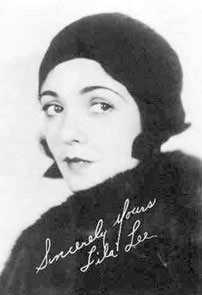Lila Lee
| Lila Lee | |
|---|---|
 | |
| Born |
Augusta Appel July 25, 1901 Union Hill, New Jersey, U.S. |
| Died |
November 13, 1973 (aged 72) Saranac Lake, New York, U.S. |
| Other names | "Cuddles" |
| Occupation | Actress |
| Years active | 1918–1967 |
| Spouse(s) |
James Kirkwood, Sr. Jack R. Peine John E. Murphy |
Lila Lee (July 25, 1901 – November 13, 1973) was a prominent screen actress of the early silent film era.
Early life
Lila Lee was born Augusta Wilhelmena Fredericka Appel in Union Hill, New Jersey (now part of Union City) into a middle-class family of German immigrants who relocated to New York City when Lila was quite young. Searching for a hobby for their gregarious young daughter, the Appels enrolled Lila in Gus Edwards' kiddie review shows where she was given the nickname of "Cuddles"; a name that she would be known by for the rest of her acting career. Her stagework became so popular with the public that her parents had her educated with private tutors. Edwards would become Lee's long-term manager.
Career
In 1918, she was chosen for a film contract by Hollywood film mogul Jesse Lasky for Famous Players-Lasky Corporation, which later became Paramount Pictures. Her first feature The Cruise of the Make-Believes garnered the seventeen-year-old starlet much public acclaim and Lasky quickly sent Lee on an arduous publicity campaign. Critics lauded Lila for her wholesome persona and sympathetic character parts. Lee quickly rose to the ranks of leading lady and often starred opposite such matinee heavies as Conrad Nagel, Gloria Swanson, Wallace Reid, Roscoe 'Fatty' Arbuckle, and Rudolph Valentino.
In 1922 Lee was cast as Carmen in the enormously popular film Blood and Sand, opposite matinee idol Rudolph Valentino and silent screen vamp Nita Naldi; Lee subsequently won the first WAMPAS Baby Stars award that year. Lee continued to be a highly popular leading lady throughout the 1920s and made scores of critically praised and widely watched films.
As the Roaring Twenties drew to a close, Lee's popularity began to wane and Lee positioned herself for the transition to talkies. She is one of the few leading ladies of the silent screen whose popularity did not nosedive with the coming of sound. She went back to working with the major studios and appeared, most notably, in The Unholy Three, in 1930, opposite Lon Chaney Sr. in his only talkie. However, a series of bad career choices and bouts of recurring tuberculosis and alcoholism hindered further projects and Lee was relegated to taking parts in mostly grade B-movies.
Personal life
Lila was married and divorced three times. Her first husband was actor James Kirkwood, Sr., whom she married in 1923. The marriage ended in August 1931 on grounds of her desertion. Lee and Kirkwood had a son in 1924, James Kirkwood, Jr., whose custody was granted to his father; he became a highly regarded playwright and screenwriter whose works include A Chorus Line and P.S. Your Cat Is Dead. Her second husband was broker Jack R. Peine (married 1934, divorced 1935) and her third husband was broker John E. Murphy (married 1944, divorced 1949). According to author Sean Egan in the James Kirkwood biography Ponies & Rainbows, Murphy’s will left Lee at the financial mercy of his widow (married subsequent to Lee), who consequently became the manipulative character Aunt Claire in P.S. Your Cat Is Dead.
Lee made several uneventful appearances in stage plays in the 1940s, and starred in early television soap operas in the 1950s. In 1973 Lee died of a stroke at Saranac Lake, New York. For her contribution as an actress in motion pictures, she was awarded a star on the Hollywood Walk of Fame at 1716 Vine Street, in Hollywood, California.
Filmography
|
|
External links
| Wikimedia Commons has media related to Lila Lee. |
- Lila Lee at the Internet Movie Database
- Silent Ladies & Gents
- Golden Silents
- Virtual Film History
- Lila Lee at Find A Grave
- Lila Lee interview with the Columbia University Oral History Research Office
- Houdini's leading ladies: Lila Lee at Wild About Harry
|